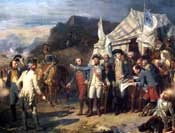Yorktown - Virginia Historic Site

THE BATTLE OF YORKTOWN
By 1781 the Revolutionary War had dragged on for over six years- from the first shots fired at Lexington and Concord to embarrassing defeats for the Americans in Canada and New York contrasted with surprising victories at Trenton, Princeton and Saratoga. Yet, there was no decisive victory over a major British force which Washington hoped would quell their appetite to subdue the Colonials. The Battle of Yorktown gave Washington that victory.
In October 1781 British General Cornwallis had gathered his armies near the coast around Yorktown, Virginia where he was ready to inflict further damage to Washington’s Army. The opposite happened. Washington had his trusted General Lafayette now in command, with additional assistance from the French- Rochambeau and Saint-Simon’s troops and the French Navy led by Admiral de Grasse. Total troops levels on the American side were roughly 16,500- more than double Cornwallis’ 7,200. Staked out along the edge of the York River, Cornwallis had allowed himself to be flanked on all sides, with nowhere to go unless he could pull off a turnaround victory on land to escape the through the American lines surrounding him.
The French and American troops began building redoubts rimming the entire British position- then followed up on October 8th with devastating cannonades which inflicted serious casualties on the enemy. Over the next week the Americans continued their encirclement of the British and followed up with even more punishing bombardments. A siege had begun and the British were suffering greatly. Cornwallis sensed doom for his Army and wrote to his colleague, British General Clinton saying “My situation now becomes very critical.” The Americans- with substantial land and sea support from the French- had caught Cornwallis in a trap from which he could not escape.
Realizing that a victory against such superior forces was improbable, Cornwallis surrendered on October 19, 1781. At the meeting of the two sides, Cornwallis refused to appear and submit to Washington, who he considered an inferior officer- so he sent His subordinate, General O’Hara. Washington returned the favor, having his General Benjamin Lincoln accept the surrender. As the two sides approached each other, the British obeyed the common 18th century practice of playing a tune popular to the other side as they surrendered. Instead of a military song, their band played “The World Turned Upside Down”. It was a fitting moment for the Americans- who’d triumphed against tremendous odds and upended the most powerful Army on Earth. The world would never be the same. Today Yorktown contains a Colonial National Historic Park along with a National Battlefield. There are extensive historic sites within the town and the battlefield.
